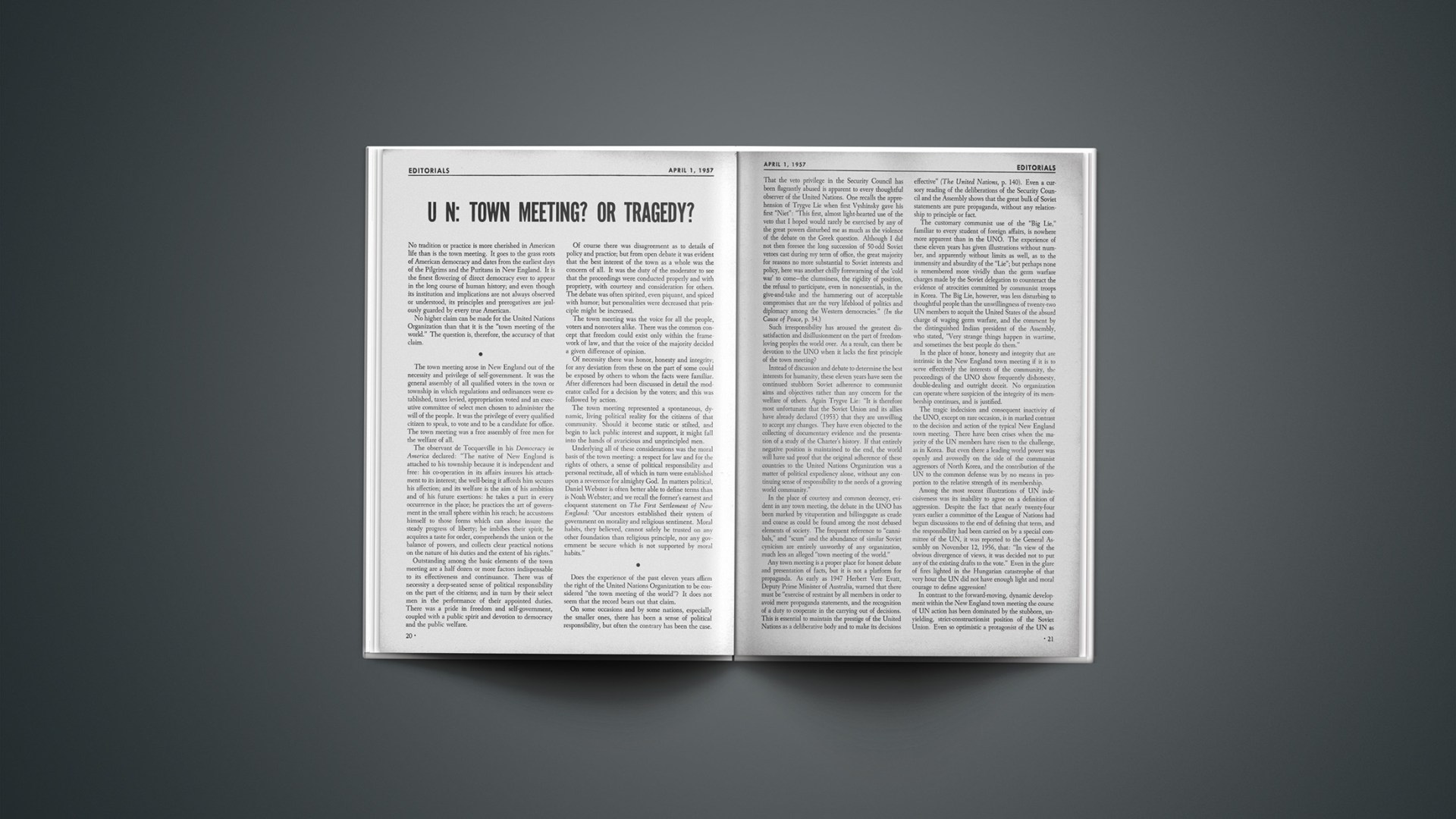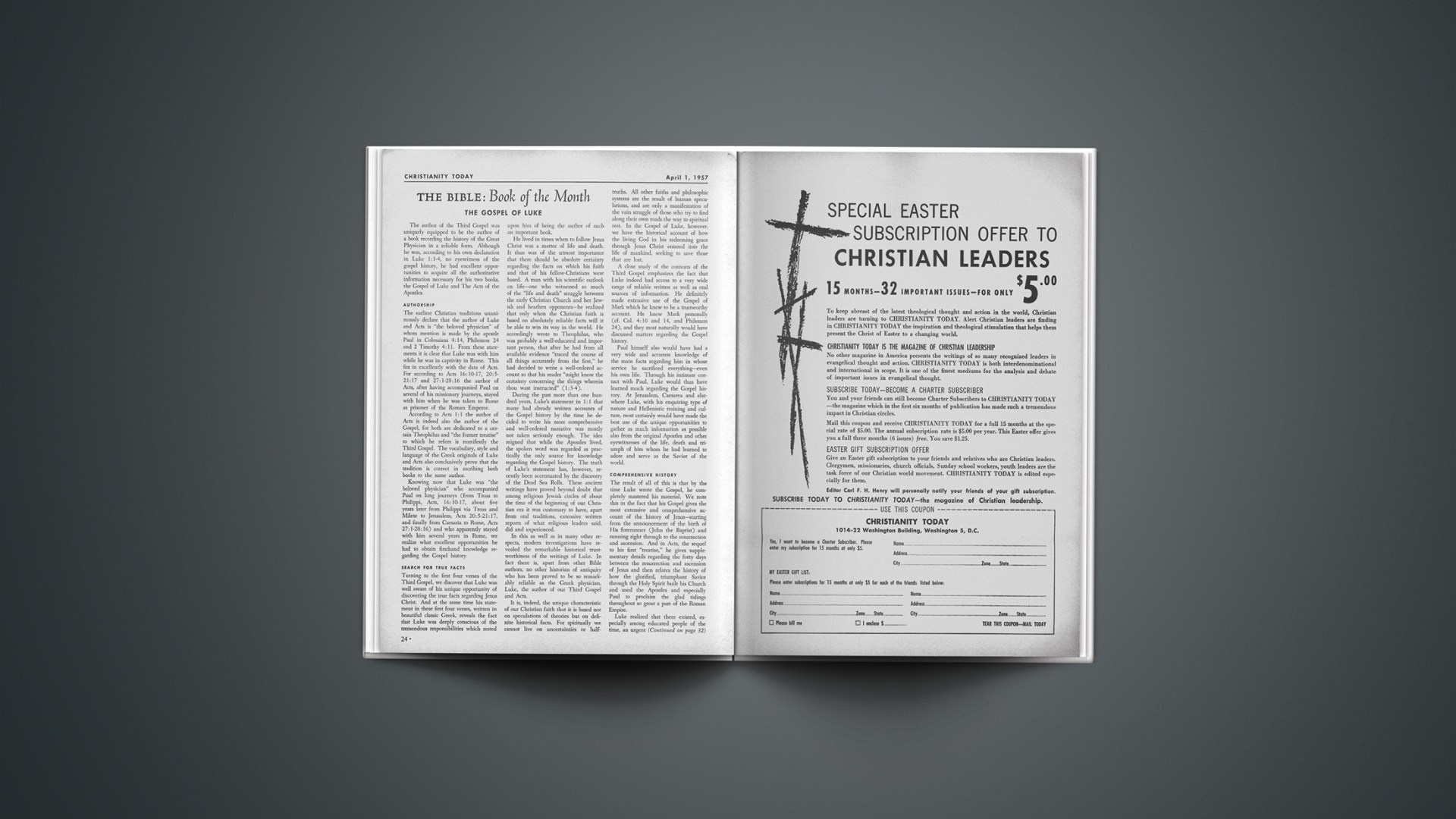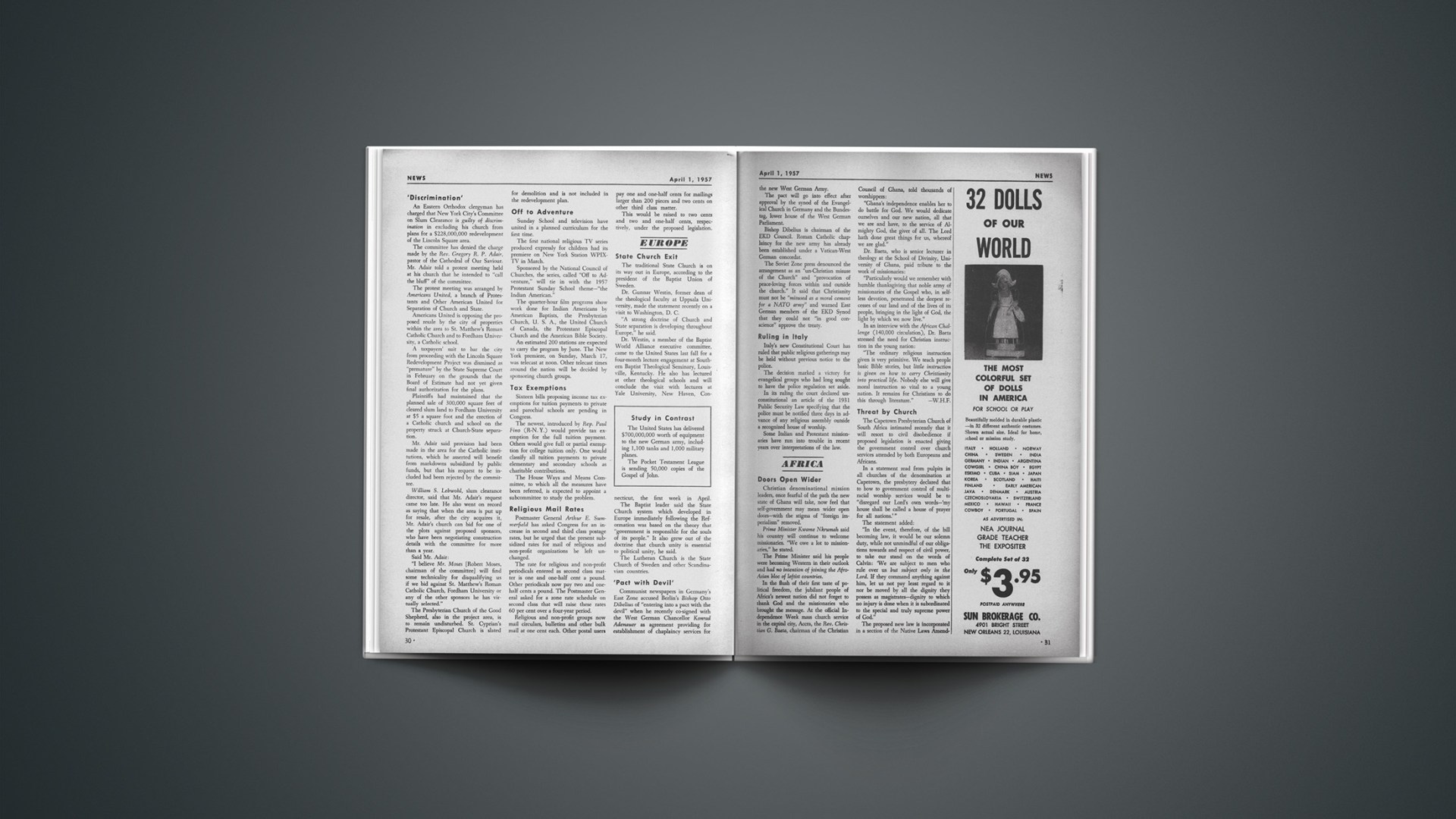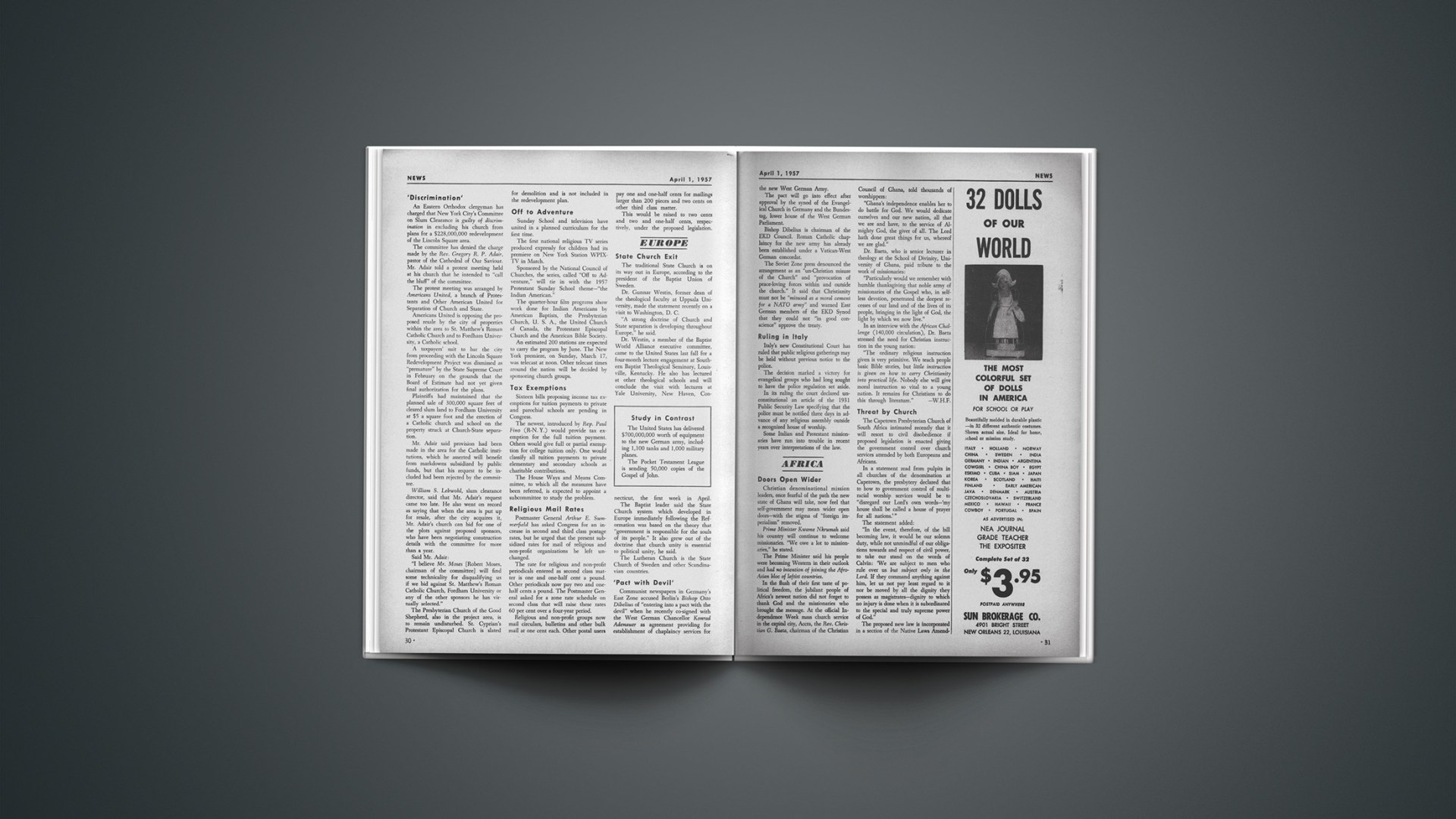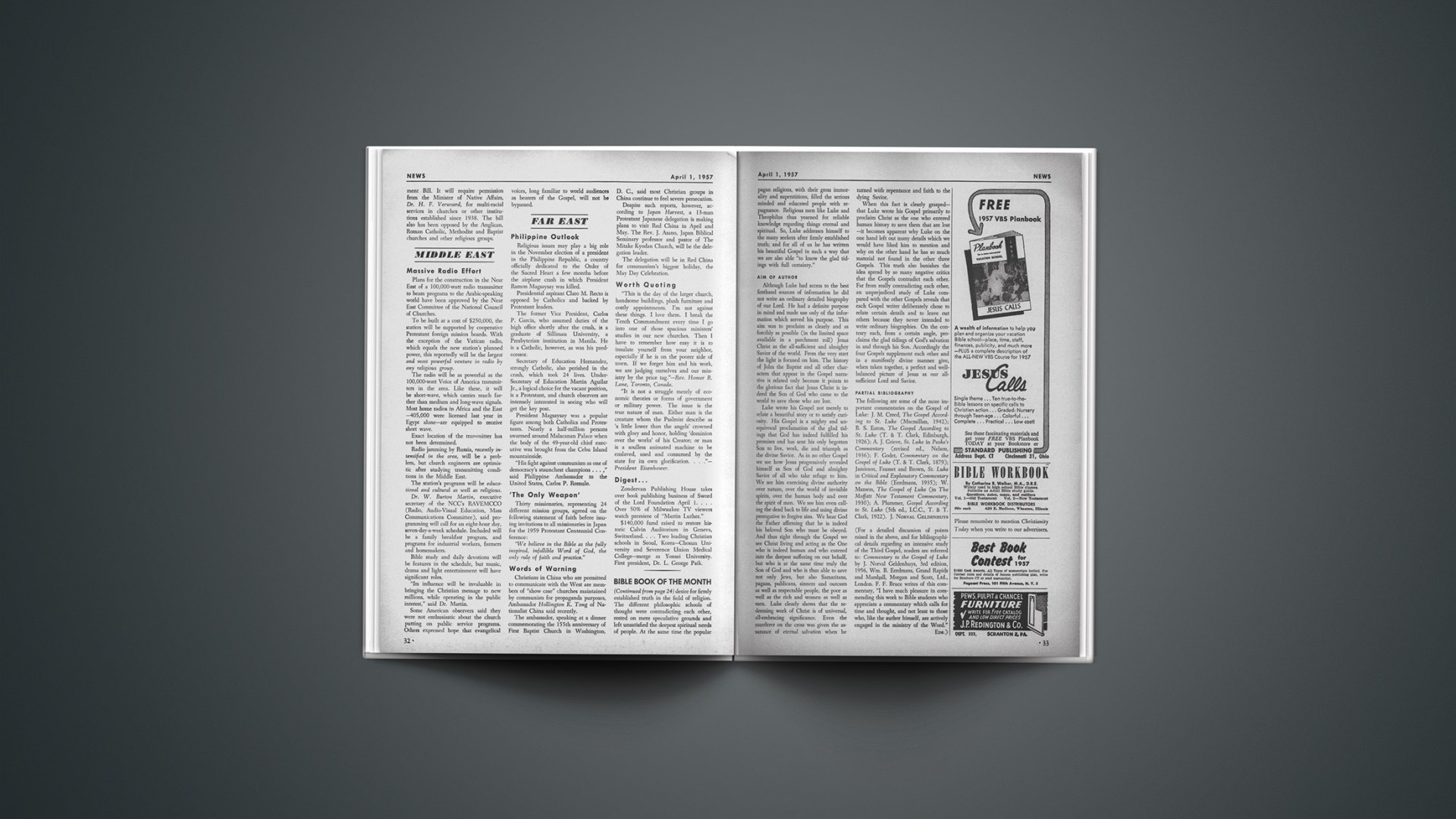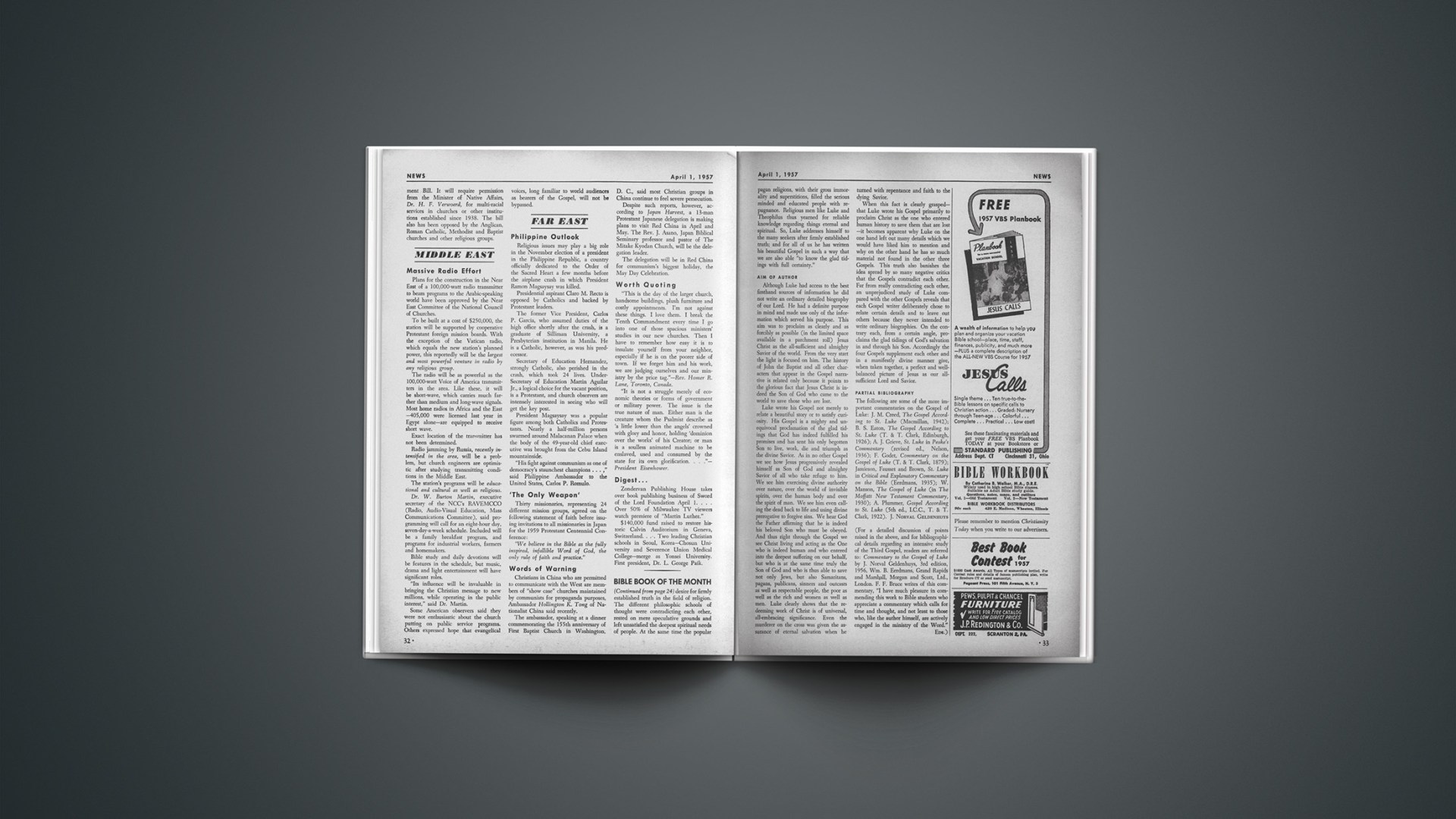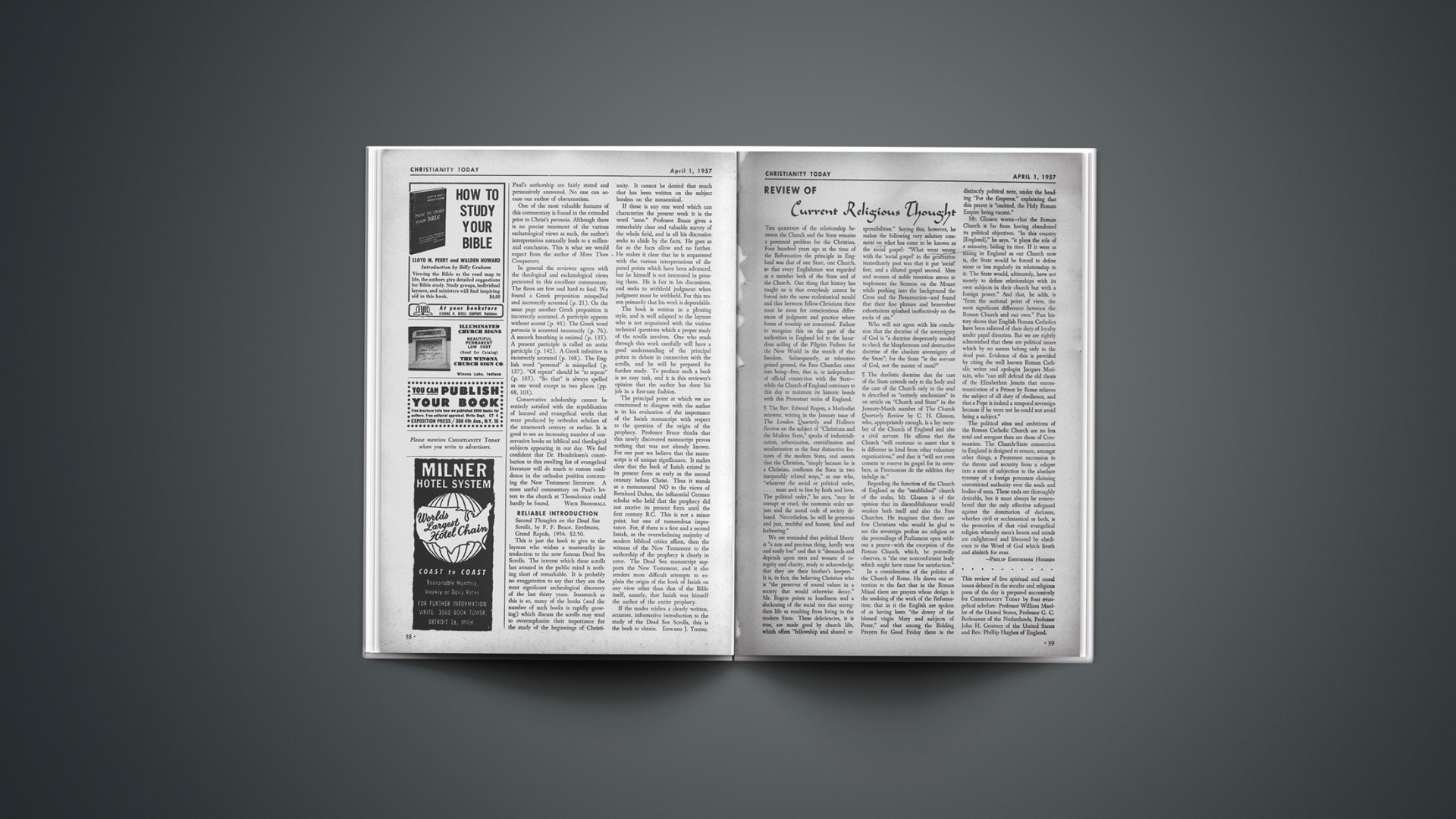U N: Town Meeting? Or Tragedy?
No tradition or practice is more cherished in American life than is the town meeting. It goes to the grass roots of American democracy and dates from the earliest days of the Pilgrims and the Puritans in New England. It is the finest flowering of direct democracy ever to appear in the long course of human history; and even though its institution and implications are not always observed or understood, its principles and prerogatives are jealously guarded by every true American.
No higher claim can be made for the United Nations Organization than that it is the “town meeting of the world.” The question is, therefore, the accuracy of that claim.
The town meeting arose in New England out of the necessity and privilege of self-government. It was the general assembly of all qualified voters in the town or township in which regulations and ordinances were established, taxes levied, appropriation voted and an executive committee of select men chosen to administer the will of the people. It was the privilege of every qualified citizen to speak, to vote and to be a candidate for office. The town meeting was a free assembly of free men for the welfare of all.
The observant de Tocqueville in his Democracy in America declared: “The native of New England is attached to his township because it is independent and free: his co-operation in its affairs insures his attachment to its interest; the well-being it affords him secures his affection; and its welfare is the aim of his ambition and of his future exertions: he takes a part in every occurrence in the place; he practices the art of government in the small sphere within his reach; he accustoms himself to those forms which can alone insure the steady progress of liberty; he imbibes their spirit; he acquires a taste for order, comprehends the union or the balance of powers, and collects clear practical notions on the nature of his duties and the extent of his rights.”
Outstanding among the basic elements of the town meeting are a half dozen or more factors indispensable to its effectiveness and continuance. There was of necessity a deep-seated sense of political responsibility on the part of the citizens; and in turn by their select men in the performance of their appointed duties. There was a pride in freedom and self-government, coupled with a public spirit and devotion to democracy and the public welfare.
Of course there was disagreement as to details of policy and practice; but from open debate it was evident that the best interest of the town as a whole was the concern of all. It was the duty of the moderator to see that the proceedings were conducted properly and with propriety, with courtesy and consideration for others. The debate was often spirited, even piquant, and spiced with humor; but personalities were decreased that principle might be increased.
The town meeting was the voice for all the people, voters and nonvoters alike. There was the common concept that freedom could exist only within the framework of law, and that the voice of the majority decided a given difference of opinion.
Of necessity there was honor, honesty and integrity; for any deviation from these on the part of some could be exposed by others to whom the facts were familiar. After differences had been discussed in detail the moderator called for a decision by the voters; and this was followed by action.
The town meeting represented a spontaneous, dynamic, living political reality for the citizens of that community. Should it become static or stilted, and begin to lack public interest and support, it might fall into the hands of avaricious and unprincipled men.
Underlying all of these considerations was the moral basis of the town meeting: a respect for law and for the rights of others, a sense of political responsibility and personal rectitude, all of which in turn were established upon a reverence for almighty God. In matters political, Daniel Webster is often better able to define terms than is Noah Webster; and we recall the former’s earnest and eloquent statement on The First Settlement of New England: “Our ancestors established their system of government on morality and religious sentiment. Moral habits, they believed, cannot safely be trusted on any other foundation than religious principle, nor any government be secure which is not supported by moral habits.”
Does the experience of the past eleven years affirm the right of the United Nations Organization to be considered “the town meeting of the world”? It does not seem that the record bears out that claim.
On some occasions and by some nations, especially the smaller ones, there has been a sense of political responsibility, but often the contrary has been the case. That the veto privilege in the Security Council has been flagrantly abused is apparent to every thoughtful observer of the United Nations. One recalls the apprehension of Trygve Lie when first Vyshinsky gave his first “Niet”: “This first, almost light-hearted use of the veto that I hoped would rarely be exercised by any of the great powers disturbed me as much as the violence of the debate on the Greek question. Although I did not then foresee the long succession of 50-odd Soviet vetoes cast during my term of office, the great majority for reasons no more substantial to Soviet interests and policy, here was another chilly forewarning of the ‘cold war’ to come—the clumsiness, the rigidity of position, the refusal to participate, even in nonessentials, in the give-and-take and the hammering out of acceptable compromises that are the very lifeblood of politics and diplomacy among the Western democracies.” (In the Cause of Peace, p. 34.)
Such irresponsibility has aroused the greatest dissatisfaction and disillusionment on the part of freedom-loving peoples the world over. As a result, can there be devotion to the UNO when it lacks the first principle of the town meeting?
Instead of discussion and debate to determine the best interests for humanity, these eleven years have seen the continued stubborn Soviet adherence to communist aims and objectives rather than any concern for the welfare of others. Again Trygve Lie: “It is therefore most unfortunate that the Soviet Union and its allies have already declared (1953) that they are unwilling to accept any changes. They have even objected to the collecting of documentary evidence and the presentation of a study of the Charter’s history. If that entirely negative position is maintained to the end, the world will have sad proof that the original adherence of these countries to the United Nations Organization was a matter of political expediency alone, without any continuing sense of responsibility to the needs of a growing world community.”
In the place of courtesy and common decency, evident in any town meeting, the debate in the UNO has been marked by vituperation and billingsgate as crude and coarse as could be found among the most debased elements of society. The frequent reference to “cannibals,” and “scum” and the abundance of similar Soviet cynicism are entirely unworthy of any organization, much less an alleged “town meeting of the world.”
Any town meeting is a proper place for honest debate and presentation of facts, but it is not a platform for propaganda. As early as 1947 Herbert Vere Evatt, Deputy Prime Minister of Australia, warned that there must be “exercise of restraint by all members in order to avoid mere propaganda statements, and the recognition of a duty to cooperate in the carrying out of decisions. This is essential to maintain the prestige of the United Nations as a deliberative body and to make its decisions effective” (The United Nations, p. 140). Even a cursory reading of the deliberations of the Security Council and the Assembly shows that the great bulk of Soviet statements are pure propaganda, without any relationship to principle or fact.
The customary communist use of the “Big Lie,” familiar to every student of foreign affairs, is nowhere more apparent than in the UNO. The experience of these eleven years has given illustrations without number, and apparently without limits as well, as to the immensity and absurdity of the “Lie”; but perhaps none is remembered more vividly than the germ warfare charges made by the Soviet delegation to counteract the evidence of atrocities committed by communist troops in Korea. The Big Lie, however, was less disturbing to thoughtful people than the unwillingness of twenty-two UN members to acquit the United States of the absurd charge of waging germ warfare, and the comment by the distinguished Indian president of the Assembly, who stated, “Very strange things happen in wartime, and sometimes the best people do them.”
In the place of honor, honesty and integrity that are intrinsic in the New England town meeting if it is to serve effectively the interests of the community, the proceedings of the UNO show frequently dishonesty, double-dealing and outright deceit. No organization can operate where suspicion of the integrity of its membership continues, and is justified.
The tragic indecision and consequent inactivity of the UNO, except on rare occasion, is in marked contrast to the decision and action of the typical New England town meeting. There have been crises when the majority of the UN members have risen to the challenge, as in Korea. But even there a leading world power was openly and avowedly on the side of the communist aggressors of North Korea, and the contribution of the UN to the common defense was by no means in proportion to the relative strength of its membership.
Among the most recent illustrations of UN indecisiveness was its inability to agree on a definition of aggression. Despite the fact that nearly twenty-four years earlier a committee of the League of Nations had begun discussions to the end of defining that term, and the responsibility had been carried on by a special committee of the UN, it was reported to the General Assembly on November 12, 1956, that: “In view of the obvious divergence of views, it was decided not to put any of the existing drafts to the vote.” Even in the glare of fires lighted in the Hungarian catastrophe of that very hour the UN did not have enough light and moral courage to define aggression!
In contrast to the forward-moving, dynamic development within the New England town meeting the course of UN action has been dominated by the stubborn, unyielding, strict-constructionist position of the Soviet Union. Even so optimistic a protagonist of the UN as Clark M. Eichelberger is compelled to state with sorrow: “The largest negative factor, of course, is the Soviet Union. The Soviet Government has been a strict constructionist; it has been the greatest defender of the text of the Charter, stripped of growth and development. It has declared illegal practically every step that has been taken to liberalize the United Nations.…”
Despite all these difficulties, which distinctly disbar the UNO from any possibility of being a “town meeting of the world,” the most disturbing is undoubtedly the lack of moral basis in that organization. Although a UN committee declared that “forced labor, employed for political coercion, or punishment for holding or expressing political views, plays a significant part in the national economy of the Soviet Union,” the UN Economic and Social Council would not identify the Soviet Union or any other country where slave labor exists.
The UN has been unwilling to hear evidence of communist atrocities involving at least thirty thousand war prisoners and civilians, including more than six thousand Americans (and the American delegation has not had the moral courage to press the issue). General Mark Clark’s report on the atrocities was never heard.
The list of moral cowardice and complicity grows longer with each session of the UN. Kashmir, Hungary and the long preliminary wrangle on Suez are but a few of the mountain peaks; no, rather, the pools of iniquity in the miasma of moral ineptitude and inaction.
Without a moral foundation of honesty, honor, integrity and willingness to work for the general welfare, the UN is building its tower of Babel on shifting sand stained with human blood. There is need to amend the Charter but even a greater need to mend the ways of the majority of its members. Courage is needed to replace the cunning of unprincipled men and cooperation rather than contemptuous criticism and vilification. There was wistfulness, and possibly wishful thinking, in President Eisenhower’s word to the United States Committee for United Nations Day (September 23, 1953) when he declared: “With all its defects, with all the failure that we can check up against it, it still represents man’s best organized hope to substitute the conference table for the battle field.”
Without moral courage, consistency and constancy, the best of hopes have no substance. Thus far the United Nations, instead of achieving the expected acclaim as “the town meeting of the world,” has been a tragedy in which the world, by the passion or limitations of its diplomats, is being brought to the brink of catastrophe.
Improving The Quality Of Religious Radio-TV
The discussion of religious radio-TV in recent years has mainly concerned the issue of fair assignment of network time to the respective Protestant constituencies. Debate over this issue gained heat when the National Council of Churches intensified its opposition to paid religious broadcasts, while seeking more sustaining or free time (some of it during priority hours) for the Council as the authoritative voice of American Protestantism. Now that this controversy has been aired, and the broadcasting industry has evidenced concern for a fair allotment of sustaining time, the problem will likely be worked out regionally and locally, rather than nationally. Religious forces in the community and the individual station managers will discuss the question of proportionate programming at the local level.
Spokesmen for the radio-TV industry have themselves emphasized that program interest is multiplied when there is a specific relationship to the particular community which the radio-TV station serves. As one station manager put it recently, the television station’s religious responsibility can best be met by the presentation of “local religious programs, conceived locally, produced locally, using local people and remaining in constant contact and consultation with representative bodies of the local spiritual community.”
This trend to local programming need not mark the absolute end of network schedules reflective of the major spiritual outlooks. But it does bring to the fore a problem fully as important as that of a fair distribution of time to the respective religious constituencies, the problem of effective radio-TV programming.
Evangelical broadcasts built around prominent personalities and dynamic preaching can undoubtedly maintain high network ratings. In the sphere of TV programming, however, evangelical effort has been mainly an independent, trial by error proceeding. The evangelicals have lacked the advantages of a national radio-TV commission with salaried leaders working cooperatively with the networks, and this has been their loss. Not that N.C.C. forces have come up with an infallible formula for successful TV presentations. Good programs of a religious nature are still at a premium, as program ratings will attest.
Evangelicals have neglected to give adequate corporate thought to the question, what is good religious programming? While the television industry has been growing to maturity, as one of the most influential mass media of the century, the evangelicals have not spent time in workshops and on basic research, as they ought, in order to use this new channel most effectively to the glory of God. A forward step in this direction has been made by National Religious Broadcasters, who are projecting a radio-TV clinic for the summer of 1958, in cooperation with a modern radio and television station in the Midwest.
The evangelical tradition has features that lend themselves uniquely to effective television programming. But there is a tendency to stop with vigorous preaching or striking musical combinations. The hierarchial churches have their symbolism and dress; the ritualistic churches, their rituals. Have evangelicals seriously inquired what moments in their services lend themselves most dramatically to television? Have they surveyed their resources for good religious programming, and interpreted them in high-level conference to the industry? Thanksgiving morning in the Pacific Garden Mission in Chicago, Easter Sunday in the Rose Bowl in Pasadena or a night in Madison Square Garden during the Billy Graham crusade—these are spectacles that hold a national interest. And there are many more.
The responsibility for good programming does not belong one-sidedly to the churches, however. Both in government and in the industry today there are highly placed officials who feel that the present prosperity can be utilized to encourage the networks to invest some resources in the effective implementation of religious programs. Once the question of free time allotments is equitably settled, and the various groups are invited within this framework to interpret to the networks their best program resources, the industry itself may well assign technical assistance to develop effective programming. If the churches can bring invisible spiritual and moral forces to the network, the industry can often suggest the best techniques for presenting them artfully. And the churches may well channel into the industry some of their youth with a vision for such vocational service, and may also well pray for the conversion of those who have professional talent but lack devotion to Christ. After all, a Gospel fitted for the television viewer is also superbly fit for the television crew.
Labor Racketeering And The American Worker
The revelations of corruption, vice and financial irresponsibility in one of the major unions have startled the nation and are bringing dismay to labor leaders in general and to the rank and file of honest and law abiding union members.
There was a time when labor as such was an underdog and when legislation was considered necessary to protect the legitimate rights of the working man. Gradually labor accumulated growing political power, and its leadership came to administer millions of dollars in funds.
Yet no controls such as those demanded of other responsible organizations were imposed on the unions. Because of this deference to labor, as in large measure responsible only to itself, the average member of a union soon found himself without an effective voice in controlling those at the top.
To his disappointment, and enlightenment, the American worker is learning that some labor leaders, who have carved their careers out of criticism of the way that big business allegedly exploits the workers, have degraded their own office and responsibility at the expense of the workers they profess to represent. Union members are learning a new truth: that organized labor too, and not management alone, holds within itself a potentiality for the irresponsible use of private power.
In recent years, union members have had to cope with the misuse of their own welfare funds by some union leaders. In the current Congressional expose of U.S. labor racketeering, which is scheduled to look beyond Portland to Los Angeles, San Francisco, New York, Philadelphia, Chicago, Minneapolis and other cities, workers see some leaders already charged with entanglement, not simply in shady financial dealings, and the misuse of union funds for selfish gain, but in the seamy spheres of vice including gambling, prostitution and the alleged bribery of officials. In an hour when governmental leaders prize the virtues of democratic government, the nation has seen the sad spectacle, in the effort to get at the truth of union vice racketeering in Portland, of a mayor who flunked a lie detector test, and a district attorney who took refuge behind the Fifth Amendment.
The tempo of indignation is rising among reputable union leaders, who fear that the exposure of shaggy union leadership may reflect upon the unions as a whole. The fact is that the tolerance of such leadership, by leaders with a concern for integrity, has needlessly contributed to this shadow over the movement. And the sooner the unions are rid of labor racketeering, the better for the unions and for the nation. The thesis that big business was especially prone to the exploitation of the worker lay at the bottom of a good bit of pro-union legislation in recent decades. Today the time has come for legislation that will scrutinize union leadership with similar rigidity.
The tide of concern extends also to the rank and file of union membership. And it is high time union members evidence a concern for the preservation of the democratic process within the unions, and preserve the answerability of their leaders to their worker constituencies.
We agree with those in Congress who say that this investigation should not be used to destroy labor. But it is a sad day for the American worker, in his struggle against the fortunes of the Soviet worker, when he must reckon with a lack of democratic opportunities to choose representative leaders and to control his own funds. The time has come when the power accorded any group having a vital role in the nation’s life should carry with it a corresponding degree of public responsibility subject to the same checks and balances obtaining in business of any other kind.

